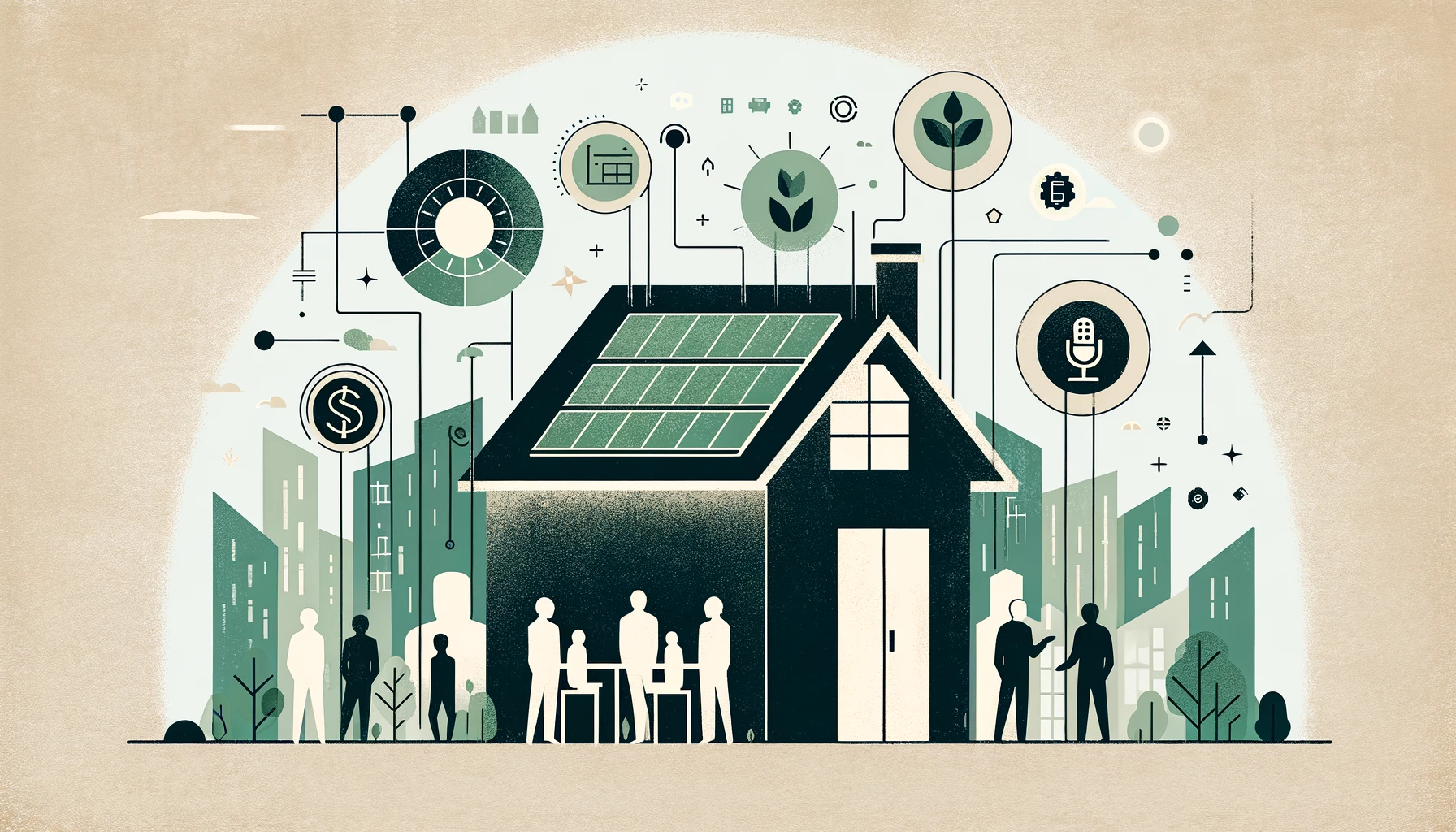
Energy One Podcast, Episode 3 - Capital Good Fund with CEO Andy Posner
Summary & Key Highlights
In today's episode, we're shifting gears to explore the crossroads of clean energy and financial empowerment. We're joined by Andy Posner, founder and CEO of Capital Good Fund. This unique nonprofit is not only making renewable energy more attainable for financially constrained families, but also offering a lifeline through small, impactful, and human-centered loans.
We will delve into the human side of clean energy adoption and the ripple effects it can have on communities and individual lives.
Our Guest Today: Andy Posner
Andy Posner, founder and CEO of Capital Good Fund, is a trailblazer in linking finance with social justice and environmental sustainability. With a master's in environmental studies, Andy pioneered the non-profit Capital Good Fund. Under his leadership, it has grown to a significant presence in 10 states, managing over $37 million in loans. Andy's focus on innovative solutions like solar leasing for low-income families showcases his commitment to accessible renewable energy and impactful community development.
Interview with Andy Posner about Capital Good Fund
Please tell us a little bit about yourself and what led you to found Capital Good Fund
I'm Andy, the founder and CEO of Cpital Good Fund. We are a nonprofit that's also certified as a community development financial institution. Our mission is at the intersection of poverty, climate change and racial justice. We do loans, leases and financial coaching for low to moderate income families for a variety of things, including energy efficiency, and solar and battery storage, both for homeowners and nonprofits.
I started Capital Good Fund during my master's in environmental studies from 2007 to 2009. Back then there was a lot of innovation happening in the clean energy financing space and I was really excited about how you could develop financial instruments that unlock the potential of energy efficiency and clean energy.
I don't have a background in financial services, so this was all new to me. When in 2008, the financial system collapsed, I didn't understand the connection between Lehman Brothers going bankrupt and a low income person being foreclosed on or losing their job. That led me down a path of learning about redlining and other discriminatory financial practices.
And I ended up coming up with this idea of starting a lender, they would operate at the intersection, like I said, poverty and climate. We got started in February of '09, and 15 years later, we're in 10 states, we've done $37 million in loans, with a 97% repayment rate.
How Capital Good Fund's services differ from traditional banks?
Even though not all of our loans are related to energy or climate, the folks that we serve are disproportionately impacted by rising energy prices by climate change, because we focus on low income folks, people of color, women and immigrants.
We have three categories of loan products. A small dollar program under $1,500, for things like catching up on utilities, rent, car repair, paying off a high interest loan; an immigration program up to $20,000 for things like citizenship, green card and family petition; and a residential lending program for energy efficiency.
In 2021, we launched a solar leasing program. Our approach, unlike traditional banks, includes low-interest rates and transparent, equitable practices. If you look, for example, at a $500 loan that we offer, it's at 12% interest; a payday loan in Rhode Island of $500, has an interest rate of 261%. We are helping people build their credit and also saving them hundreds of dollars in interest in fees.
We also offer financial coaching to impact their lives beyond just the loan itself, you can find similar differences across our products.
In the solo lending space, there are a lot of entities that will come in and charge a hidden 50% dealer fee; We don't charge any fees of any kind. We're more transparent in our servicing and our underwriting policies and procedures and practices. We're nonprofit, we don't have investors who are requiring us to generate a certain return. We do have some grant dollars that can subsidize their operations so we can pass those savings on to customers. And of course, we're just purely mission aligned.
The cost of renewable energy has decreased, but it's still not in reach for those who need it most. How do you think your organization is changing this paradigm?
Those benefits have not flown equally, and there's a couple of reasons for that.
One of them is that the investment tax credit is a credit and not a refund. So if you don't have any taxable income, that tax credit doesn't do any good.Tt's literally the definition of a regressive policy. We advocated to make that tax credit refundable but it was stripped out of the final version of what became the inflation Reduction Act.
Companies are disinclined to sell in low income communities, because they're worried about they think it's riskier, those homes are smaller, so they're not going to make as much money. People who do sell in those areas are more predatory actors, that kind of door knockers were promising free solar. There's just strict underwriting criteria and mistrust among low income homeowners.
We launched our loan program in 2021 and we struggle to do solar loans for low income people, because of the lack of refundability of the credit. Also, as interest rates started to rise, we had to raise our rates a bit, because we do borrow the money that we lend out.
Another challenge is that if you're low income, you may save money day one. But let's say you unexpectedly have to sell the home in three to five years, you're not likely to have recouped your investment yet, and you may not have enough equity in the home or enough of a premium on the sailboat to pay off the loan. Now you potentially are stuck with debt.
For all those reasons, when we saw in the inflation Reduction Act that the commercial tax credit, what's called Section 48, was made refundable to nonprofits, I immediately realized solar leasing is the way to go for doing this for low income families.
What do you feel is the general sentiment that these communities have towards green energy today?
While from a climate change perspective, the fastest route potentially to reducing emissions is just building massive solar farms, I say potentially because interconnection queues are delaying that. But still, arguably, you get more climate bang for your buck. We need more policy beyond just the inflation Reduction Act. And I worry that if low income families continue to not see the equal benefits of these policies, it's gonna be difficult to ask them to keep supporting them.
Eventually, if we needed a carbon tax, you're going to need broad base of support, and the best way to get that support is for low income families to directly benefit from clean energy. In California, The Public Utilities Commission just created net metering 3.0, which reduced the value of net metered energy and the argument they used was in part that low income families are not getting solar. They're disproportionately bearing the cost of subsidizing higher income people's residential solar. It's a dubious argument, but there's some validity to it. You could certainly rebut it more easily if there was actually low income solar.
There's also these door knockers. People are very skeptical because there's people going around saying, 'Oh, you get free solar, it's a government program', anf you end up with sketchy leases. That's why when we designed our program, we partnered with municipalities, with faith communities, nonprofits and community leaders to have their imprimatur to say to the community, 'If you hear about a solar program, and it's the Georgia Bright, which is the name of our program, trust it. Still verify, but it's like the one that we're supporting. If you hear some other guy who is selling you roof shingles, be very skeptical'.
That's been a key thing. We launched two weeks ago, we've already gotten 90 inquiries, and we're ready to schedule our first two signings next week for low income homeowners to do solar and storage.
What are some of the unexpected challenges or discoveries that you've come running your organization?
There's a lot. One is the challenge of vetting contractors. Ultimately, the clean energy revolution is going to happen at the point of sale between a contractor and a customer, and a contractor is a contractor in many ways, so we all have skepticism about that.
Figuring out a means by which you properly vet the installer, because the last thing you want is to have horror stories where a customer has a bad experience and they're out money. But then also we're out money, because we're borrowing like the money that we use to fund the system. If we had a lot of bad actors and we defaulted, that would hurt our ability to do this and more scale.
The other one is energy efficiency. We've done about 1500 heat pump loans over the years and the challenge right now is still that the guy or woman that goes to your house, they're gonna want to put the thing that's on the truck, which is usually not a heat pump. Having that conversation with the homeowner about the more expensive repair that will be cheaper over time is a challenge still.
When it comes to solar, no one's dying to have solar, it's not the most urgent thing in the world. Making the process smooth it's a challenge, because going solar is not easy in the US: the interconnection, the permitting process. What we're trying to do from our end is make our process as easy as possible: simple application, easy to understand lease agreement, and then have the installer and our team handle as much of it as possible.
More broadly, just the challenge of raising capital to do this, because in order to deliver savings to low income families, you really need to borrow at a fairly low interest rate. And right now, if we were borrowing at market rates, it would be something like 8, 10, 12% and it wouldn't work. We couldn't deliver savings to low income families. We ended up having to get money from foundations that are more mission-aligned investors, and it just takes us longer to raise the capital.
And then also supply chain issues: the cost of a battery it's kind of a moving target, interconnection processes, they vary by utility, the policy changes. We're doing this in Georgia that doesn't have net metering. It's a market where we're needed because absent us, no one's doing solar, really.
What is the next step for Capital Good Fund? Are there any upcoming initiatives or projects?
We spent the last 10 months almost exclusively focusing on launching this lease program. It is to my knowledge, the first solar lease in the US, could be corrected, but to my knowledge, where a nonprofit is the lessor, so we the nonprofit own the system, we install it on the home of a low income homeowner or a nonprofit or church for example, and then we lease it for an amount that's less than their previous utility bill. And then we handle the operations and maintenance.
And the reason we can do that, again, is because we can now monetize the 30% tax credit, as well as any adders like the Energy Community Hatter. So while we're about to sign our first two leases, I mean, this is a multibillion dollar need and opportunity for us over the next 10 years. So we're focused on optimizing the program raising more capital. One of the most exciting things at the moment is the Greenhouse Gas Reduction Fund, which is $27 billion of the inflation Reduction Act allocated.
The application process actually just closed for a lot of those programs. And so we put into submission, for example, for $250 million grant for doing more low income solar in Georgia. If we get that grant, we will do 8000 Single Family leases for low income families over the next five years. So the scale of growth and opportunity that we're looking at is tremendous. And a lot of other states are looking to our model to be replicated either by us or for us to provide technical assistance for a local group to do that.
In addition, we are looking at potentially launching end of next year an EV (electric vehicle) lease because it turns out that the commercial EV tax credit is also available to nonprofits as a refund. So we could do a program where we buy the EV, we own it, we claim the tax credit, and then we lease it to a low income driver, we'll see what the timeline is, it's going to be very complicated, I'm sure. But in a bit, there's a lot of things like that.
And then I could see us you know, the economics of charging are still not great, we actually have an EV charging station in our parking lot, a level three, and we basically break even, but as the economic start to get better, I could see us getting into like leasing EVs stations to nonprofits that want to host charging stations in a parking lot, for example.
So one of the things that's interesting is that the commercial EV credit isn't subject to the same restrictions that the individual credit is. So I believe any electric vehicle, if it's owned by a commercial entity can claim the $7,500 credit, it doesn't have those same, you know, domestic content, all those requirements. So that's why a lot of EV makers right now are pushing leases, because that's the way they can deliver more a lower price to the buyer.
What impact do you hope that your organization will have on the future?
Yeah, I mean, of course, we want to decarbonize and reduce emissions by as much as possible. But as I mentioned before, there are probably faster ways to do it than a bunch of four kilowatt systems on low income homes. So not only am I looking to do that, but I'm also looking to engage more citizens in the clean energy revolution to be bought into it, to see the benefits of it, to start businesses in it, to work in it, to save money as a result of it, and support policies for it.
Additionally, we're working to create jobs. So for example, in our program, one of our installers is a black woman owned solar installer, who hires among others, returning citizens. So people have been released from prison for nonviolent offenses, but still, so it's creating jobs in the community. She's a local woman, it's building wealth. So for us, it's really demonstrating that you don't have to operate on parallel tracks.
I mean, this is very much the environmental justice argument, the Biden administration with their justice 40 initiative. But it's one thing to say environmental justice, it's another thing to run a program that actually does reduce emissions, creates jobs for people that need them, saves low income people money. And I believe that we can do that at scale for us, but also that we can create models that can be replicated by others.
Moreover, we want to transform markets. So for example, in Georgia, one of our goals is to have a program that's so successful that the Public Service Commission and the state legislature decides to at least create a carve out for low income net metering, because if you did that, now you could have the Sunruns of the world operate profitably in Georgia.
And now we crowd in more competitors in the marketplace. We bring down prices, we do more decarbonisation work. So we're interested in advancing good policy, bringing more people in the marketplace and reaching as many consumers and nonprofits as possible with our programs.
Do you have any cases or success stories that you'd like to share with us today, something you just can't forget?
Yeah, we've done our 13,000 loans and had 2000 people go through our financial coaching. So there's quite a bit. One story that I find particularly exciting is, especially because I'm the son of an immigrant, my mother emigrated here from Ukraine in the 70s. And we've been doing our immigration loans since day one.
We had a woman who initially came to us for a loan to get a green card back in 2011. Took out the loan was able to do that as a result, she was able to start a cleaning business, her credit score went up because of the loan, she took out a subsequent loan to fix her car further improved her credit, she did our financial coaching, she was able to build a debt management plan, build her credit even more. As a result of that she was able to buy a home, once she had home, she was able to take out our energy efficiency loan to save money.
So she now has more cashflow. And now she's looking to getting a solar loan. I can't claim that that's the trajectory for every one of our clients. But you think about it as someone who started with us undocumented, now has a green card, has their own business, excellent credit, has a home with equity in it has energy efficiency, and will soon be going solar. That is the dream scenario. For us.
That's why we do this. I mean, we're very different from a Sunrun, or whatever, or any other lender that's just very transactional, their metric of success is: we originate the loan, got paid back, and we got the spread that we were looking for. If we had 100% repayment rate, but we weren't changing lives of people that needed it, then I would go home. I mean, that's not what we do. That's not the goal, as a nonprofit.
So we build long term relationships with people. And you know, for example, one of the things that's different about us is that when COVID hit, we were in a position to reach out to every single one of our clients and offer them no-questions-asked deferments. Banks and others weren't necessarily able to do that, because they have other types of economic pressures to generate returns for their customers.
So it's just a different ballgame, being a nonprofit. Now, being a nonprofit entails other challenges, like not necessarily having as much capital available to invest in growth and the like. But certainly the reason for doing this hard work is those impact stories.
If you could get a few words out to everyone in the United States, or maybe even the world, what would you say?
I would say that everyone wants to do good, or most -- almost everyone, but I think a lot of people are maybe a little misguided about how they think about that. So the typical trajectory is, you know, I'm going to do my job, and then donate some of my money or do some volunteer work or when I retire, maybe I'll work in the social sector or volunteer work.
And what I want people to hear is that we really have the solutions we need to solve most of the challenges we face, what we lack are people to implement them and the policies and the capital, which means if you have money, what we need is for you to invest it at concessionary rates in innovative programs, domestically and abroad. Or to donate money to those programs.
We don't need you to keep making more money, and then eventually invest it and we don't need you working and making a lot of money. I'd much rather you work for us, take a slightly lower paycheck and help us implement the solutions. So it's both a cause for optimism that I really do believe we know how to solve whatever challenges that we face: poverty, hunger, climate, overfishing, etc.
We need people to do it. And it's a hard slog. And the way to do it isn't as like something you do after hours. If you work for 60 hours a week at Goldman Sachs financing, palm oil in Borneo, and then you donate 10% of your income to, I don't know, Greenpeace, that doesn't work. I'd rather you work for Greenpeace and have no money to donate.
Get in touch with Andy Posner
Book recommendations
- "Banker to the Poor" by Muhammad Yunus.
- "How to Change the World" by David Bornstein.
- Also mentioned: "The Deluge" by Stephen Markley.
Disclaimer: This podcast is for informational and educational purposes only, and does not imply suitability. The views and opinions expressed by the presenters are their own.
For any inquiries or comments, you can reach us as info@energy1podcast.com.
The Energy One Podcast is brought to you by Ladybug Energy. Get energy tips and advice at LadybugEnergy.com.
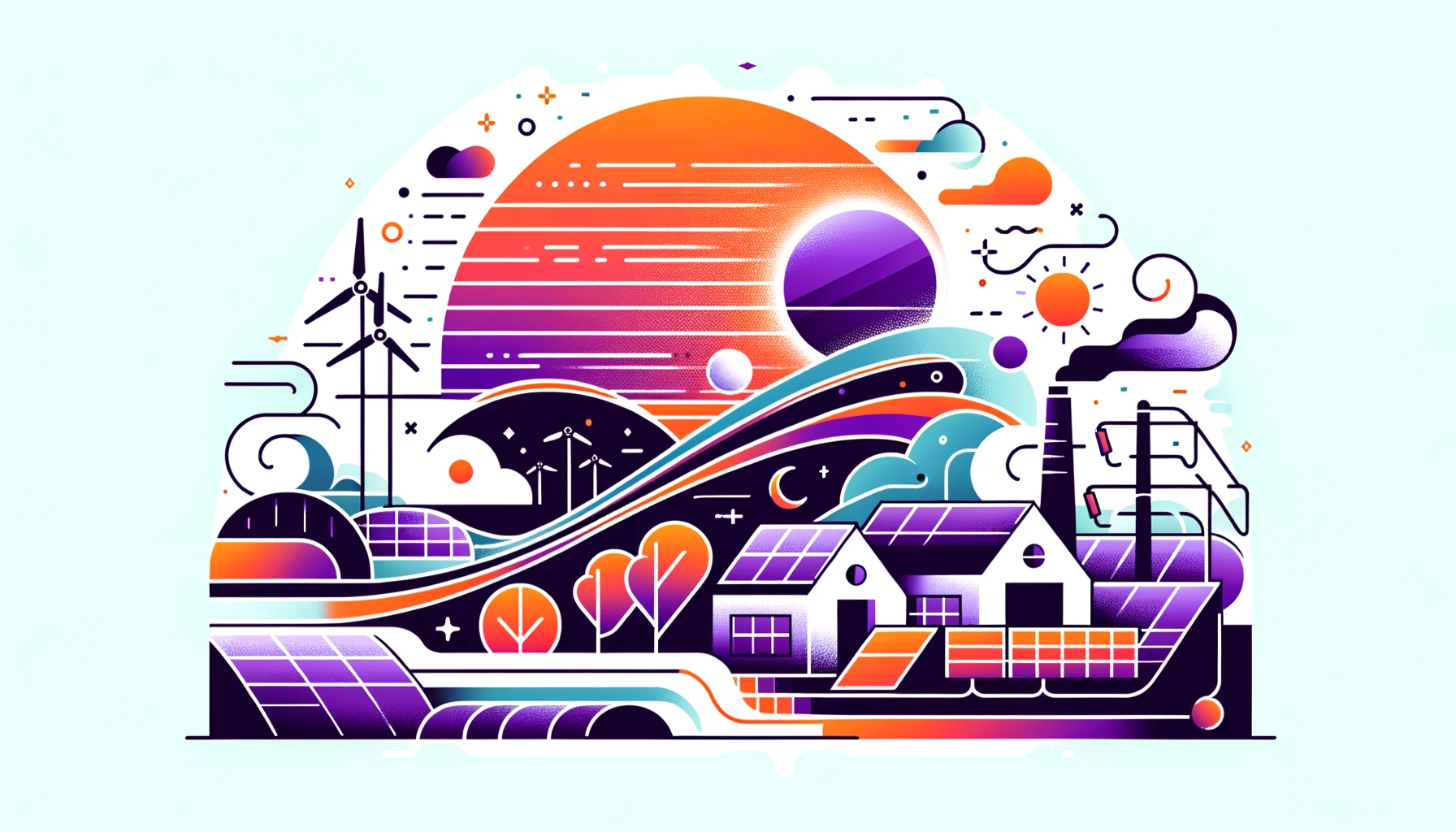
January 23, 2024
Energy One Podcast, Episode 6 - Rhythm Energy and Net Metering with CEO PJ Popovic
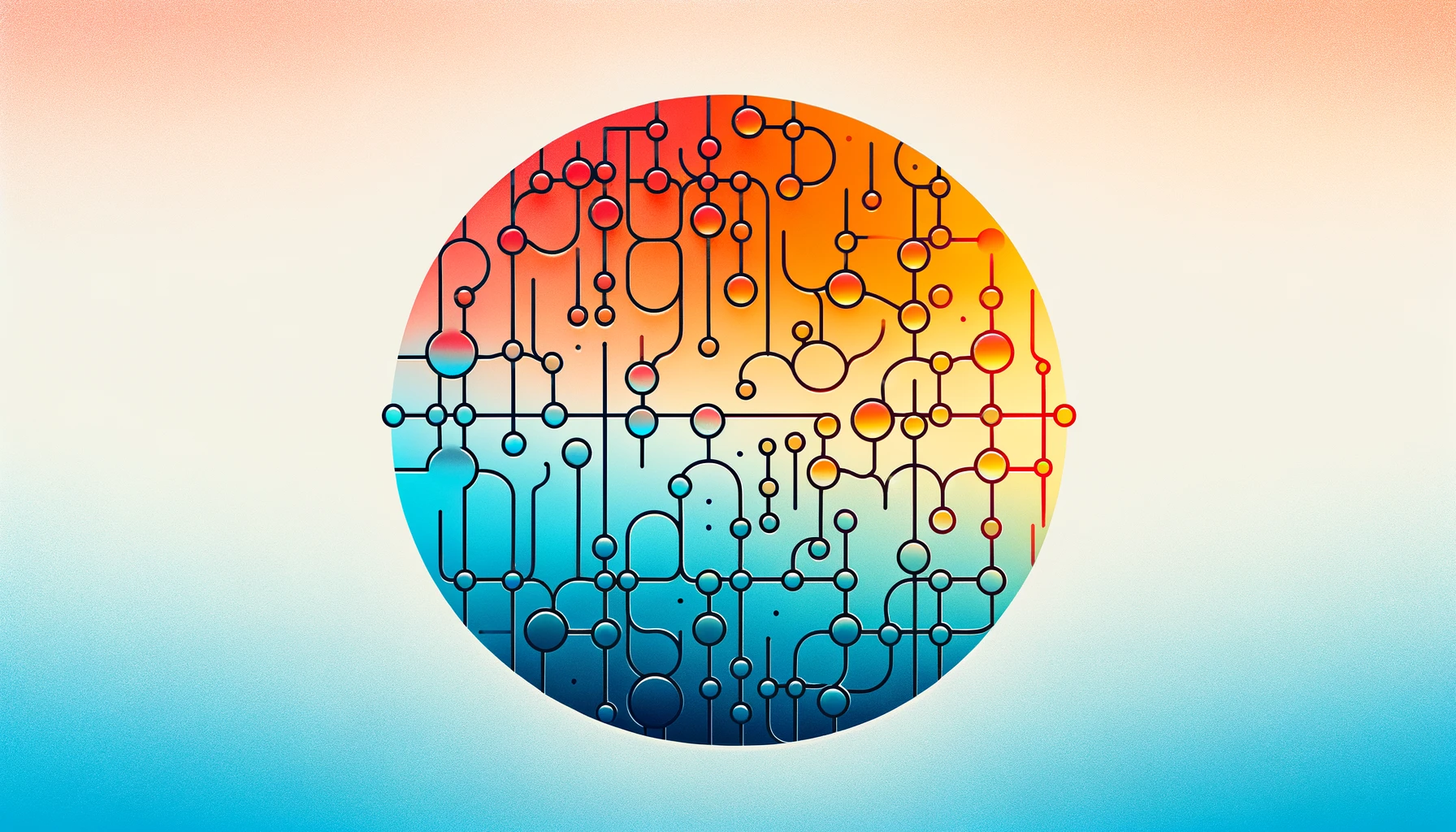
January 3, 2024
Energy One Podcast, Episode 5 - Entrochemistry and Entrochemical Systems with CEO Sanza Kazadi
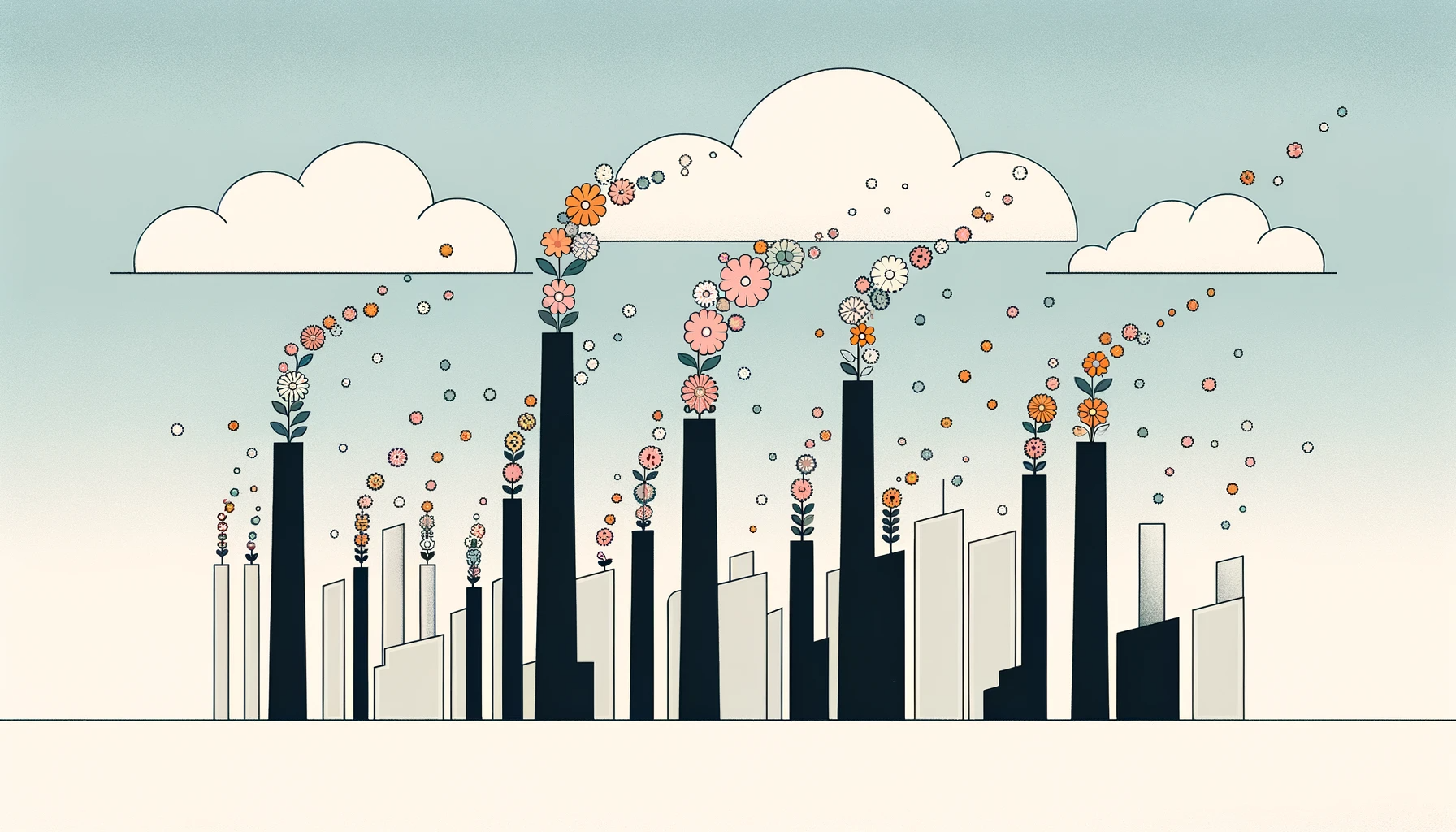
December 22, 2023
Energy One Podcast, Episode 4 - Nitrilation with Mars Materials CEO Aaron Fitzgerald

November 21, 2023
Energy One Podcast, Episode 2 - Flower Turbines with Dr. Mark Daniel Farb

November 7, 2023
Energy One Podcast, Episode 1 - Smart Grids with Dr. Joshua Rhodes
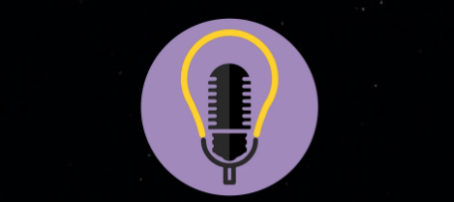
November 2, 2023